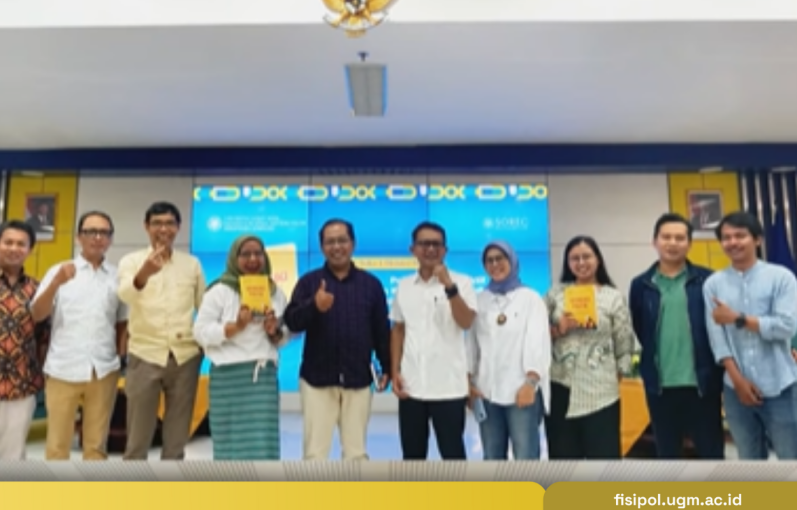
Yogyakarta, March 19th 2025─The Department of Sociology, Faculty of Social and Political Sciences (Fisipol) held a Public Discussion and Book Review on “Political Sociology: Contemporary Perspectives and Approaches Reflecting on Young People’s Political Practices” on Wednesday (19/3). Together with a number of political and sociology experts of Fisipol UGM, the discussion raised the urgency in political perspectives apart from political actors and media.
Delivered by lecturer of the Department of Sociology, Dr. Lambang Trijono, the writing of the book was motivated by unrest over political discourse that pays less attention to social perspectives. “There is a desire to develop where politics is. I noticed that political discussions do not see the reality in our society,” he said. So far, political discussions have been closely related to the narrative of power and authority of the government as a political actor. However, the community as a group that has sovereignty in a democratic system is neglected.
Politics is basically everything related to the fundamentals of policy-making by the government. In this process, there are various factors that play an important role and should be the main consideration. Lambang explained that political institutions and actors may indeed play a role as policy makers. It is easier to take political discourse from a number of actors than to see the response and political role of the community. “Even though the institution also departs from the social base of society. There needs to be a discourse to look at society from a global scale,” he explained.
The political issues in the book raise the issue of modernity in society. The contemporary approach is aimed at reviewing current issues, such as globalization, the development of the digital world, youth and community movements, and others. The book does not focus on the role of political actors and government office holders, but looks at the overall process that occurs in society as a form of representation of political participation.
The same thing was conveyed by the Vice Rector for Student Affairs, Community Service, and Alumni, Dr. Arie Sujito, S.Sos., M.Si.,. According to him, the reason why political discourse is less desirable is because the discussion continues to reflect the behavior of political actors. “If politics is only seen from the side of political institutions and actors, there are many who hate it. Political news in the media usually discusses the behavior of political actors, not the essence of politics itself,” said Arie.
Issues such as inclusivity, welfare and community are rarely discussed. Although there is a dominant factor where the media is currently competing with digital media by following the movement of people’s interests, this has created a negative sentiment towards political narratives. “The narrative is that politics is detrimental to society. So politics should be discussed in a broader scope,” Arie added.
As a result, there is a phenomenon of decreased hope and pessimistic sentiment in society. Arie emphasized how people should be enthusiastic about the election results and have a lot of hope for the fate of the nation in the next five years. Unfortunately, the current conditions are exactly the opposite of this. Most of it is indeed caused by various policies and political phenomena that are not in accordance with the interests of the community. However, the people’s resistance movements are less attractive to the media.
“If then the narrative is built from the response of people who feel dissatisfied with the policy, it will be interesting,” Arie said. The book “Political Sociology: Contemporary Perspectives and Approaches Reflecting on Young People’s Political Practices” contains a broad discourse on political views, especially from the perspective of society and young people. The hope is that this book can be an educational tool and shift the view of politics in society.
